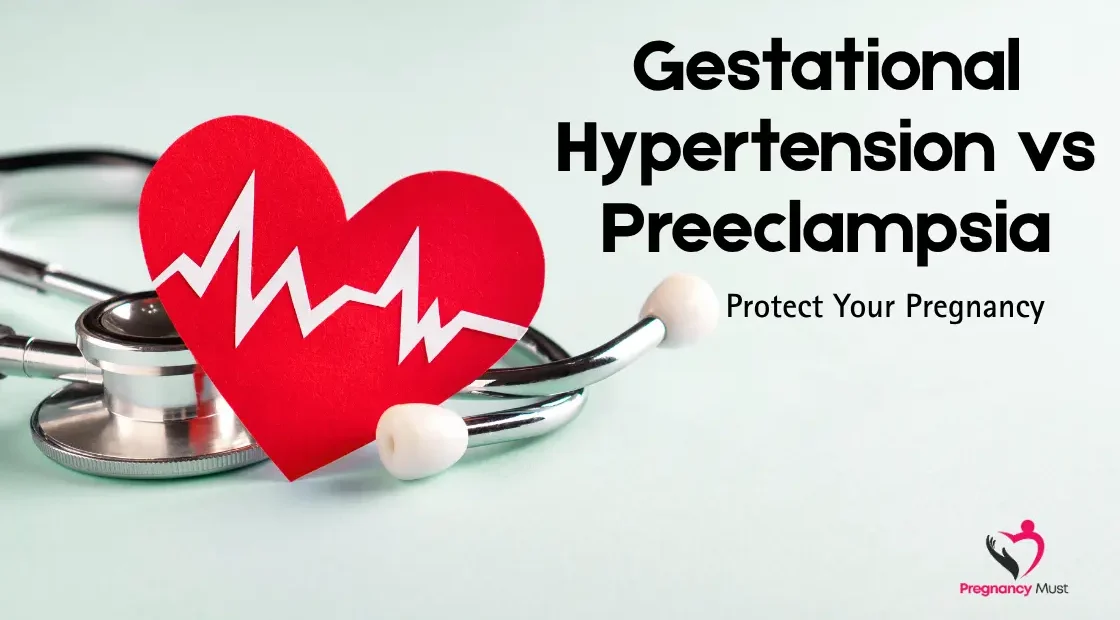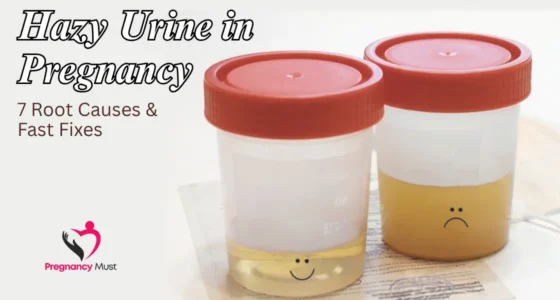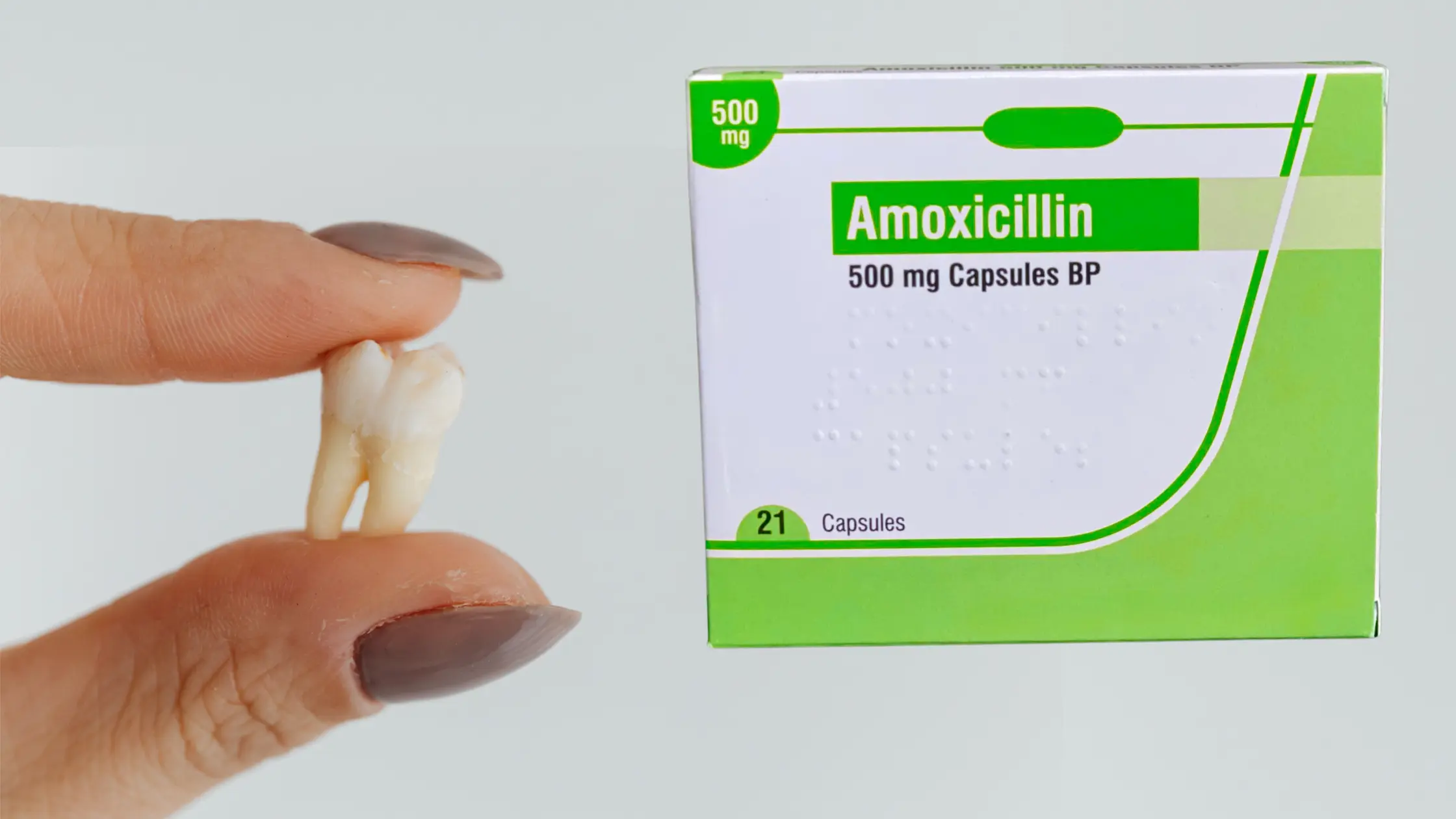The terms gestational hypertension vs preeclampsia is often mentioned in pregnancy discussions. It is of paramount essence that expectant mothers should comprehend these conditions, as they are dangerous to both the infant and the mother. Gestational hypertension has similarities with preeclampsia, but they are not the same disease and ought to be monitored and managed differently.
Table of Contents
- Gestational Hypertension Vs Preeclampsia: The Key Differences
- Symptoms: Gestational Hypertension vs Preeclampsia
- Causes and Risk Factors for Gestational Hypertension and Preeclampsia
- Risks Associated with Gestational Hypertension Vs Preeclampsia
- Treatment and Management
- Can Gestational Hypertension Turn into Preeclampsia?
- Complications of Untreated Preeclamptic Hypertension and Preeclampsia
- Monitoring and Prevention of Gestational Hypertension and Preeclampsia
- Preventive Measures for Gestational Hypertension and Preeclampsia
- FAQ Section: Common Questions on Gestational Hypertension Vs Preeclampsia
- Conclusion: Managing Gestational Hypertension Vs Preeclampsia for a Healthy Pregnancy
Gestational Hypertension Vs Preeclampsia: The Key Differences
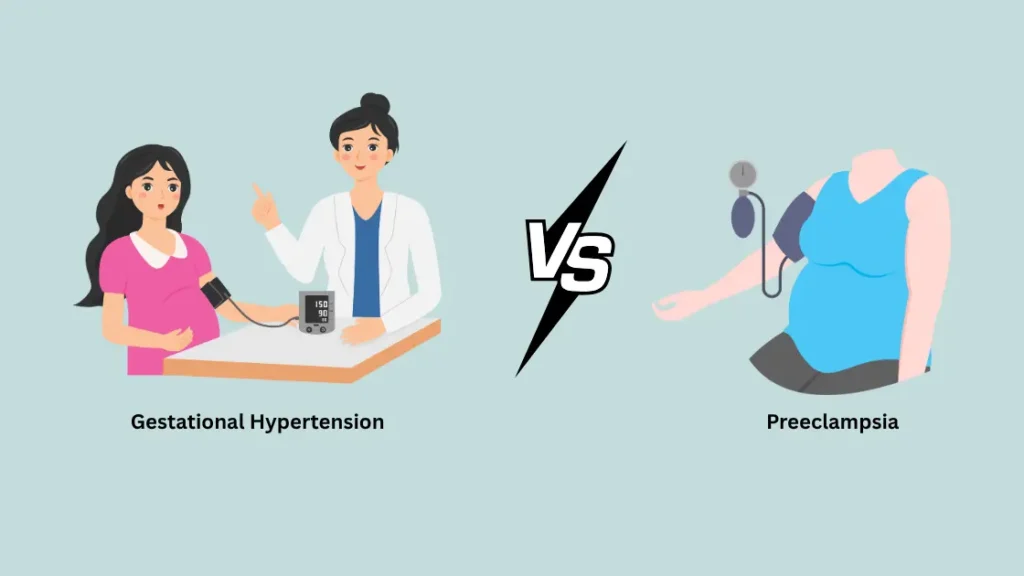
Gestational Hypertension
Gestational hypertension is a condition that develops during the period past the 20th week of pregnancy and usually involves an occurrence of raised blood pressure (hypertension). When left untreated, it can affect the mother and the baby.
Occurs After 20 Weeks of Pregnancy:
Gestational hypertension occurs beyond the 20th week of pregnancy. In the event that high blood pressure occurs earlier, it is not regarded as gestational but as chronic high blood pressure instead.
Characterized by High Blood Pressure:
Gestational hypertension is characterized by high blood pressure that is normally greater than 140/90 mmHg. It puts pressure on the cardiovascular system and may cause additional problems if it is not addressed.
No Protein in the Urine:
Gestational hypertension, unlike preeclampsia, does not cause protein to show in the urine. One of the major symptoms of preeclampsia is proteinuria, indicating the involvement of the kidneys, hence, it serves as a more serious symptom.
Generally Less Severe than Preeclampsia:
Gestational hypertension is mild, compared to preeclampsia, which is associated with organ dysfunction and protein in the urine. Nevertheless, it is a danger, and it needs close attention.
Can Progress to Preeclampsia if Untreated:
In case gestational hypertension is not treated, it may develop into preeclampsia, which is a more serious condition when organs are damaged and other problems accompany preterm birth or stroke. It is imperative to monitor this development closely in order to avoid it.
Preeclampsia
Preeclampsia is life-threatening, a developing condition of pregnancy later than the 20th week. It is typified by high blood pressure and proteinuria, and it is riskier than gestational hypertension.
Occurs After 20 Weeks of Pregnancy:
Similar to gestational hypertension, preeclampsia occurs when the pregnancy is more than the 20th weeks old. It could also arise during postpartum, and therefore, early detection should be a priority in order to treat the condition.
High Blood Pressure with Protein in Urine:
Preeclampsia is characterized by hypertension (greater than 140/90 mmHg) and proteinuria. This combination suggests the presence of a kidney disorder and contributes to the fact that preeclampsia is hazardous than gestational hypertension.
Can Cause Organ Damage (Kidneys, Liver):
Preeclampsia may result in impairment of crucial structures such as the kidneys and the liver. It may progress to HELLP syndrome, which consists of major hepatic injury, thrombocytopenia, and hemolysis, which jeopardizes the health of the mother and the infant.
More Dangerous for Both Mother and Baby:
The importance of preeclampsia as compared to gestational hypertension lies in the possible onset of organ failure, seizures (eclampsia), stroke, premature birth, placental abruption, and even stillbirth.
Requires Careful Monitoring and Sometimes Early Delivery:
The importance of preeclampsia as compared to gestational hypertension lies in the possible onset of organ failure, seizures (eclampsia), stroke, premature birth, placental abruption, and even stillbirth.
Symptoms: Gestational Hypertension vs Preeclampsia
| Symptom | Gestational Hypertension | Preeclampsia |
| High Blood Pressure | Yes | Yes |
| Protein in Urine | No | Yes |
| Swelling | Mild (hands, feet) | Severe (face, hands, legs) |
| Weight Gain | Gradual | Sudden, rapid (more than 5 pounds/week) |
| Headaches | Rare | Severe, persistent |
| Vision Changes | Rare | Yes |
| Upper Abdominal Pain | Rare | Yes |
Causes and Risk Factors for Gestational Hypertension and Preeclampsia
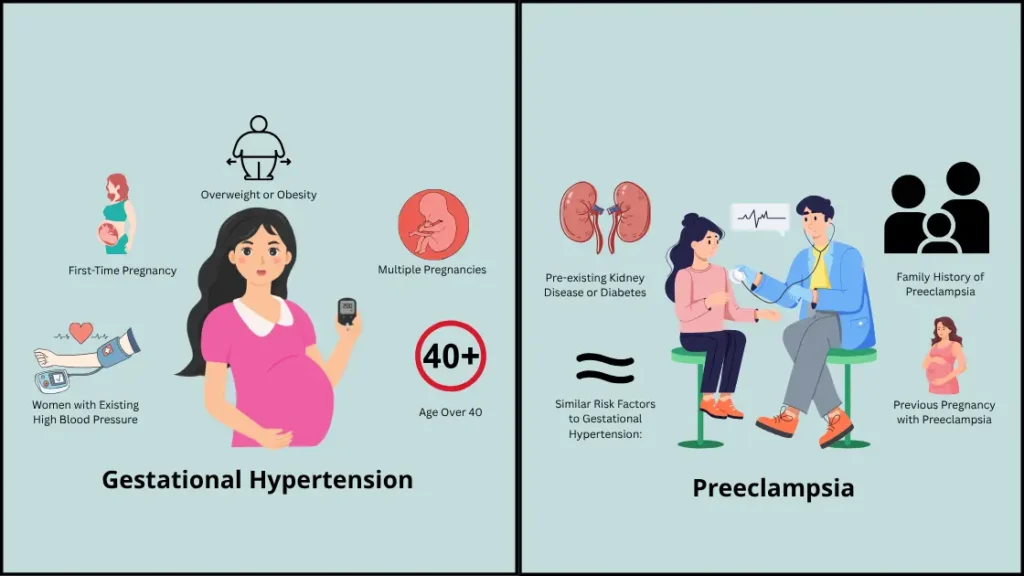
The causes and risk factors of gestational hypertension and preeclampsia are crucial in knowing how to detect it early enough and thus preventing it. The two conditions are associated with a series of factors which may contribute to the chances of having high blood pressure as a pregnant woman. What about causes and risk factors of each then?
Gestational Hypertension: Causes and Risk Factors
Gestational hypertension normally occurs after week 20 of the pregnancy period and is mostly caused by an increase in blood pressure. Common risk factors are shown below:
Women with Existing High Blood Pressure:
Women who have a history of high blood pressure have an increased chance of gestational hypertension. Preexisting hypertension may complicate pregnancy and make them susceptible to hypertension in the future.
First-Time Pregnancy:
Pregnancies among first-time mothers are prone to gestational hypertension. High blood pressure is one of the complications that may emerge due to changes that the body undergoes to accommodate the pregnancy.
Overweight or Obesity:
The occurrence of gestational hypertension increases in women who are overweight and those who are obese prior to pregnancy. Obesity increases blood pressure and is, in most cases, accompanied by other conditions such as diabetes, which makes it riskier.
Multiple Pregnancies (Twins, Triplets):
The cases increase because women who are pregnant with multiples are at a higher risk, as they endure extra weight and stress, and their hormones change and pose risks of developing gestational hypertension.
Age Over 40:
Pregnant women who are above 40 years face higher risks of gestational hypertension. One of the risk factors of high blood pressure is advanced maternal age.
Preeclampsia: Causes and Risk Factors
Like gestational hypertension, preeclampsia also relates to elevated blood pressure during pregnancy; however, the problem is more serious as it may result in some organs being damaged. Check out the following causes and risk factors of preeclampsia:
Similar Risk Factors to Gestational Hypertension:
Most risk factors pertaining to gestational hypertension also pertain to preeclampsia, such as being overweight, pregnant for the first time, multipara, and pregnant at an older age (more than 40).
Preexisting Kidney Disease or Diabetes:
Those already existing diseases, such as kidney disease or diabetes, put women at a greater risk of getting preeclampsia. These states pose a challenge to the organs and increase the risk of developing complications such as high blood pressure and the presence of protein in the urine.
Family History of Preeclampsia:
The risk is much increased in case there is a family history of preeclampsia, particularly in mother or sister. Inheritable factors could play a role in genetic factors that could influence responsiveness of the body to pregnancy, hence family history is a vital risk factor.
Previous Pregnancy with Preeclampsia:
Preeclampsia has a tendency to repeat among women who have had the condition in an earlier pregnancy. There is an increased risk if the preceding one was severe or complicated.
Risks Associated with Gestational Hypertension Vs Preeclampsia
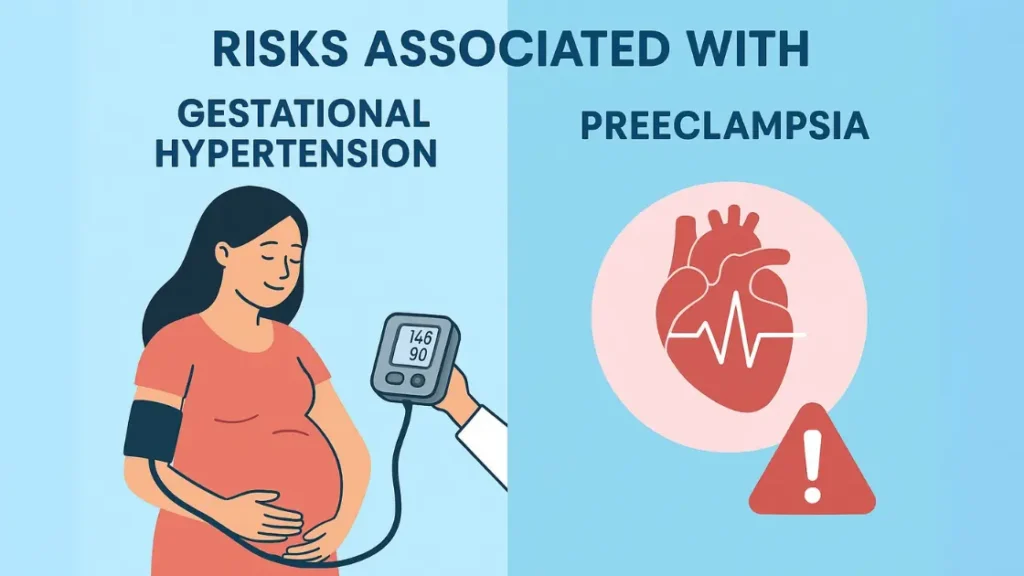
Gestational hypertension and preeclampsia are both dangerous and pose threats to both the mother and the child. Although gestational hypertension usually does not raise such intense symptoms as preeclampsia, they are equally important to watch since they can affect both the mother and the baby, posing certain threats to their health and safety. The major risks of both conditions are listed below:
Gestational Hypertension: Risks
Gestational hypertension has to do with high blood pressure in pregnancy, not accompanied by protein in the urine. Otherwise, it may result in a number of complications:
Placental Abruption (Separation of Placenta):
Placental abruption is a serious risk in which the placenta comes detached prematurely, inducing bleeding in the uterus wall. It is a life-threatening condition that needs medical care.
Stroke or Heart Failure (If Untreated):
When gestational hypertension is not under control, it may develop cardiovascular complications such as a heart attack or heart failure. High blood pressure places stress on the heart and blood vessels, which puts a person at risk of serious events in life.
Preterm Delivery:
The placental health may be compromised, which restricts the blood flow to the baby as a result of high blood pressure. This can lead to premature birth, otherwise known as prematurity, which may lead to respiratory difficulties and developmental setbacks, among others.
Preeclampsia: Risks
More serious clinical manifestation is characterized by preeclampsia, which includes the development of high blood pressure and protein in the urine, which commonly causes dysfunction of internal organs. Risks are more severe, and they may happen to a baby and a mother:
Organ Failure (Kidneys, Liver):
Preeclampsia may result in organ dysfunction, especially that of the kidneys and the liver. This may progress to HELLP syndrome (Hemolysis, raised liver enzymes, and Low Platelets), which needs urgent medication.
Eclampsia (Seizures):
When it is not treated, preeclampsia can evolve to eclampsia, which is characterized by seizures. Eclampsia is a situation that brings about lasting consequences to the brain, stroke, or death when not attended to in time.
Premature Birth or Stillbirth:
The preeclampsia also predisposes the child to birth before term because the placental function becomes hindered. In the worst conditions, it can even lead to stillbirth. Sometimes, early delivery may be needed in order to save the mother and the baby.
Risk of Future Cardiovascular Disease:
Female preeclampsia patients pose a bigger risk of facing heart problems in their future lives. The harm caused by high blood pressure in pregnancy has the possibility of damaging the heart condition, which increases the chances of high blood pressure and heart disease.
Treatment and Management
| Treatment/Management | Gestational Hypertension | Preeclampsia |
| Blood Pressure Monitoring | Frequent checks, at home or clinic | Continuous monitoring, possibly hospitalization |
| Medications | Antihypertensive drugs if necessary | Antihypertensive drugs, magnesium sulfate for seizures |
| Diet and Lifestyle | Low-sodium diet, regular exercise | Bed rest, low-sodium diet, hospitalization if severe |
| Delivery | If controlled, delivery may be normal | Early delivery if condition worsens or pregnancy is near term |
Can Gestational Hypertension Turn into Preeclampsia?

Yes, gestational hypertension vs preeclampsia is often seen as a continuum. Gestational hypertension may turn into preeclampsia. Failure to manage preeclampsia properly is important to understand that early detection and monitoring can play a significant role, as it allows avoiding additional issues and ensuring the security of mother and baby.
Complications of Untreated Preeclamptic Hypertension and Preeclampsia
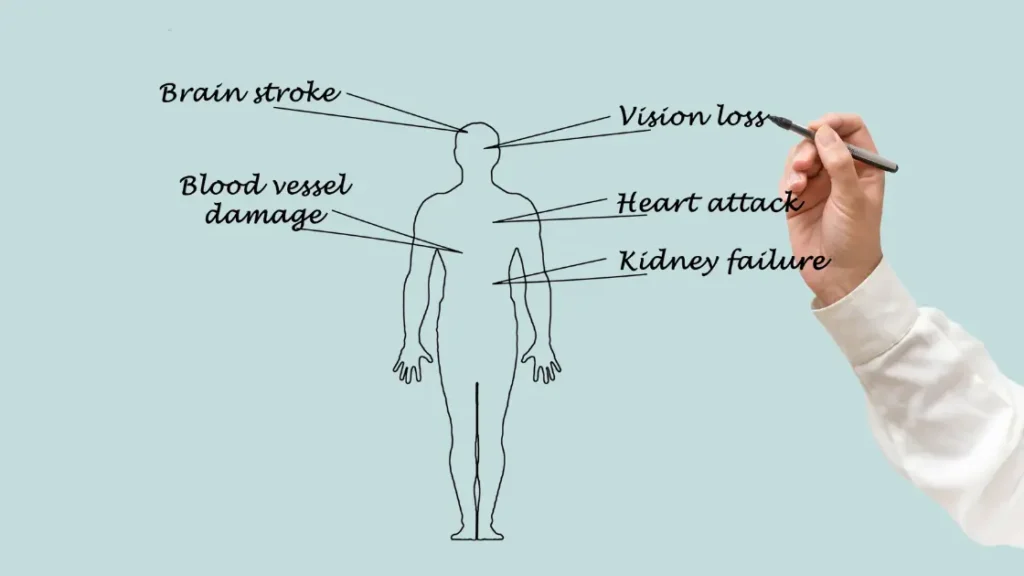
When not properly managed, gestational hypertension vs preeclampsia can result in severe complications for both mother and baby. Unmanaged gestational hypertension can result in a stroke, abruption of the placenta, or early birth. In the meantime, the condition of preeclampsia might result in organ damage, convulsions (eclampsia), and even future preeclamptic situations.
Monitoring and Prevention of Gestational Hypertension and Preeclampsia
Early and consistent monitoring is essential in preventing complications of gestational hypertension vs preeclampsia. Women who are pregnant are highly advised to conduct frequent prenatal exams to have their blood pressure checked. Risk factors force pregnant women to do urine protein testing, and additional ones are necessary when the symptoms appear.
Preventive Measures for Gestational Hypertension and Preeclampsia

Regular Blood Pressure Check-Ups
Why: Early monitoring helps to intervene and detect early in time and thereby avoid the risk of complications such as stroke, placental abruption, or organ damage.
How: Attend regular prenatal visits and consider more frequent check-ups if at risk.
Managing Preexisting conditions
How: Diabetes and hypertension, puts a person at risk of gestational hypertension and preeclampsia.
How: Control blood sugar and blood pressure with medication, diet, and exercise.
Healthy Eating and Active Lifestyle
Why: The reason is that, with healthy blood pressure and weight, a properly balanced diet and physical exercises prevent the risks of complications.
How: Consume low-sodium with nutrient-rich food, engage in Preeclampsiad minimize excessive weight gain.
FAQ Section: Common Questions on Gestational Hypertension Vs Preeclampsia
Q1: Can gestational hypertension be prevented?
A1: Of course, it cannot always be avoided. A healthy lifestyle can decrease the risks.
Q2: How is preeclampsia diagnosed?
A2: Diagnosis of preeclampsia is done by measuring preeclampsia pressure, testing urine to determine the presence of protein by blood test.
Q3: Is it possible to have both gestational hypertension and preeclampsia in one pregnancy?
A3: Yes, gestational hypertension vs preeclampsia can coexist, making it essential to monitor both conditions closely.
Q4: Can I have a normal delivery if I have gestational hypertension?
A4: Most preeclampsia or gestational hypertension are treated. Pregnancy might be normal, but it will depend on the severity of the condition.
Q5: What happens if preeclampsia is left untreated?
A5: Untreated preeclampsia may cause problems such as organ damage, seizure, or even death, so it is strongly recommended to treat preeclampsia.
Conclusion: Managing Gestational Hypertension Vs Preeclampsia for a Healthy Pregnancy
Understanding the differences between gestational hypertension vs preeclampsia is vital for ensuring a healthy pregnancy. Timely detection, monitoring, and an appropriate treatment plan can deal with both conditions. Pregnant women should be aware of their health and report to the doctor on time in case of the emergence of symptoms. It is important that you update your doctor of any alterations in your condition in order to ensure the safety of the mother and the baby.
Stay updated with every concern that may rise in pregnancy with Pregnancy Must –
